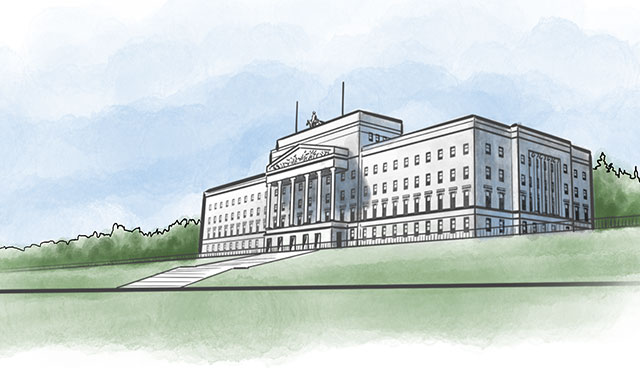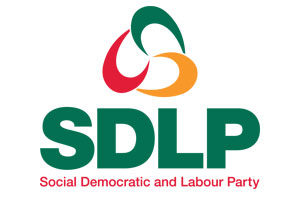Platform: Dealing with the past


Over three years since the Stormont House Agreement set out a pathway for dealing with legacy in Northern Ireland, political parties are still divided on a resolution. With the launch of fresh talks aimed at getting an operational Northern Ireland Executive by new Secretary of State Karen Bradley, Northern Ireland’s largest political parties have outlined their respective positions.
Linda Dillon MLA, Sinn Féin legacy spokesperson
The legacy of our recent conflict is viewed by Sinn Féin as a rights issue which has featured in every negotiation from the Haass/O’Sullivan process up to the present day. We have played a positive role in these proceedings, being the first party to agree to the Haass/O’Sullivan legacy proposals in December 2013, while signing up to the legacy mechanisms agreed at the Stormont House talks a year later.
Since then we have continuously lobbied the British Government to implement and adequately resource these mechanisms via a Westminster legislative process.
In addition, we have fully supported the Lord Chief Justice’s call to resource his five-year plan to clear the backlog in legacy inquests while endorsing the Police Ombudsman’s call for additional resources to allow him to complete outstanding legacy investigations.
We currently await the realisation of the British Government’s promise to initiate a pre-legislative consultation process, which is pending since last July. Any such process must be meaningful, transparent and accessible to all victims and survivors and wider society. A timeframe of 14-20 weeks is required to facilitate an informed understanding of the key provisions contained in the draft Legacy Bill followed by a considered response.
We are strongly opposed to any attempt to introduce any new alternative proposals, such as ‘statute of limitation’ or any amnesty for State forces into the consultation process. The consultation should solely focus on the provisions contained within the draft Legacy Bill presented to all parties last year.
Sinn Féin is also a strong advocate for the provision of high quality services for all those harmed during the conflict and a pension for all those who have been seriously injured. We are also committed to the adoption of the UN gender approaches to post-conflict situations (UN Resolution 1325). The current definition of a victim should remain as outlined in the Victims and Survivors (NI) Order 2006, which was arrived at through consensus and has served the victims and survivors constituency well.
Too many families have waited too long, in some cases over 40 years, for closure by way of an Article 2 investigation or inquest or the timely provision of disclosure in relation to the circumstances surrounding their death.
The British Government must end its policy of systemic delay and implement the Stormont House Agreement legacy mechanisms in a human right’s compliant manner and provide the necessary resources for all legacy institutions.
Doug Beattie MLA, Ulster Unionist Party justice spokesperson
Troubles legacy is one of those difficult big-ticket items that has never been dealt with in any substantial way since the Belfast Agreement. Various piecemeal initiatives, judicial reviews and poor judgments have created a win/lose environment and has left the Police Service of Northern Ireland (PSNI) beleaguered, isolated, vulnerable and undermined in the eyes of many.
The Ulster Unionist Party (UUP) has been clear on legacy. There should be no attempt to undermine the PSNI and there should be no attempt to rewrite a difficult history that saw 90 per cent of killings here carried out by terrorists, republican and loyalist.
Legacy investigations should be fair, proportionate and balanced and should take into account the environment of the time and the level of violence that took place. Consequently, any legacy structures – in particular the Historical Investigations Unit (HIU) – must have a balanced case load, should form part of the PSNI with its own structures answerable to the Police Ombudsman, and not be a parallel police force.
The HIU must have the ability to reinvestigate Historical Enquiries Team (HET) cases that are clearly flawed. It must be able to discount cases that have previously been investigated in line with investigatory techniques and capacity at the time, and should have the ability to reopen cases where there is a public interest, such as those surrounding individuals in positions of authority.
The Independent Commission on Information Retrieval (ICIR) cannot be allowed to produce reports which name individuals or organisations unless those named have had the ability to see the information and rebut any allegations. Not to do so gives the ICIR a level of authority that is unprecedented in legal circles.
In the last all-party talks on the Legacy Bill, the NIO indicated that the UK Government will release every scrap of information for HIU investigation and only redact sensitive information when the report goes out to the family. Unfortunately, the Irish Government has stated that it will redact information – via the Garda or Irish Directorate of Military Intelligence – before investigation, thus corrupting any possible charges that may be brought forward. This is unacceptable.
We are also concerned that a pension for those seriously injured during the Troubles through no fault of their own, is not part of the Legacy Bill or public consultation, while a Statute of Limitations – which would lead to an amnesty – is part of the consultation. We cannot support an amnesty and we have and have raised this with the NIO.
Legacy investigations should be fair, proportionate and balanced and the current proposals are not.
Dolores Kelly MLA, SDLP justice spokesperson
The challenge we all face is to address the legacy of the past and the needs of victims and survivors comprehensively and ethically. We have travelled a long way in 20 years of peace but in all that time, we’ve fundamentally failed to meet the needs of those who suffered most during the conflict. Providing victims and survivors with truth, justice and accountability would be one of the single greatest contributions to reconciliation and healing. It is the leftover business of our peace.
For years, the SDLP has produced detailed proposals aimed at building institutions which will maximise the opportunities for accountability, acknowledgement and truth. We have urged successive governments to advance the cause of reconciliation by meeting the needs of victims and survivors.
Critically, we have advocated a victim-centred approach to addressing the past. The powerful testimony of those who have suffered loss over the last 40 years is a moving reminder that these are people who have been abandoned by political leaders for generations. They feel like political leaders are just waiting for them to die so that the issue can be forgotten. Not on our watch.
A victim-centred and led approach should have produced a parallel process to the political negotiations, enabling direct input into the design and content of legacy institutions. The absence of such an approach has denied people their proper place at the table and has led to the failure to establish a comprehensive model for addressing the past. It’s time now to bring people inside the process.
No party, and no government, can hold a veto over progress on this issue. That includes the funding of legacy inquests, the provision of additional resources to establish the Stormont House bodies, and the full disclosure of information pertinent to investigations by those bodies.
Since the terms of the Stormont House proposals were made public, there has been little progress on the issues which prevented a more comprehensive agreement. The Lord Chief Justice has rightly been challenging political leaders to provide the necessary resource to proceed with legacy inquests. The SDLP has acknowledged the strong and structured approach of his office on inquest reform and his keen desire to take forward this important programme of work. That must begin in earnest.
It’s also clear now that the £150 million contribution from the London Government is transparently inadequate to fully address the scale of legacy investigation. That requires a very significant uplift and, in fact, should be subject to annual review to ensure that there is no attempt to address the past on the cheap or in haste.
Fundamentally, the delay and the blockages in dealing with the past point to an attempt to address legacy matters on terms that protect vested interests and not on the basis of truth, justice, accountability and acknowledgement. There is, too often, a mutual interest between State actors on one hand and illegal organisations on the other, particularly those who held positions of ‘command and control’, to resist truth and justice. We are determined that they cannot prevail and that the legacy of the past is dealt with in a way that meets the layered needs of those who experienced the worst aspects of it.
David Ford MLA, Alliance Party justice spokesperson
The recent episode involving the use of the Kingsmills atrocity by politicians across the divide to score political points demonstrated the urgent need to deal with the past. This is not just an issue for victims and survivors. If we don’t deal with the trauma suffered by individuals, our entire society will be unable to move on.
During the Stormont House talks in 2014, many Alliance proposals on dealing with the past were agreed in order to take the issue forward in a way both sensitive and inclusive of the needs and wishes of victims and survivors.
As Justice Minister, I worked with the Lord Chief Justice and proposed extra funding to speed up legacy inquests: a plan never put to the Executive by the First and deputy First Ministers.
Alliance also put proposals to the DUP and Sinn Féin as part of negotiations around the Justice Ministry in May 2016. They did not accept them.
We hoped by now we would have made major progress on resolving outstanding issues around legacy matters. But thanks to rejection of our plans by the two biggest parties, we are still without a resolution. All of that is deeply concerning.
Victims are far too important to be used as a political football, which is precisely how they continue to be treated by some. The current status quo is not sustainable – instead, we need to comprehensively deal with the past so victims and their loved ones can have their issues resolved as a matter of urgency.
This means an inclusive deal, bringing together all the new institutions discussed over three years ago, with the funding promised by the Prime Minister. We cannot allow our future to be defined by our past. Settling those issues, getting beyond the hurt and building a united community are vital for all of us.









